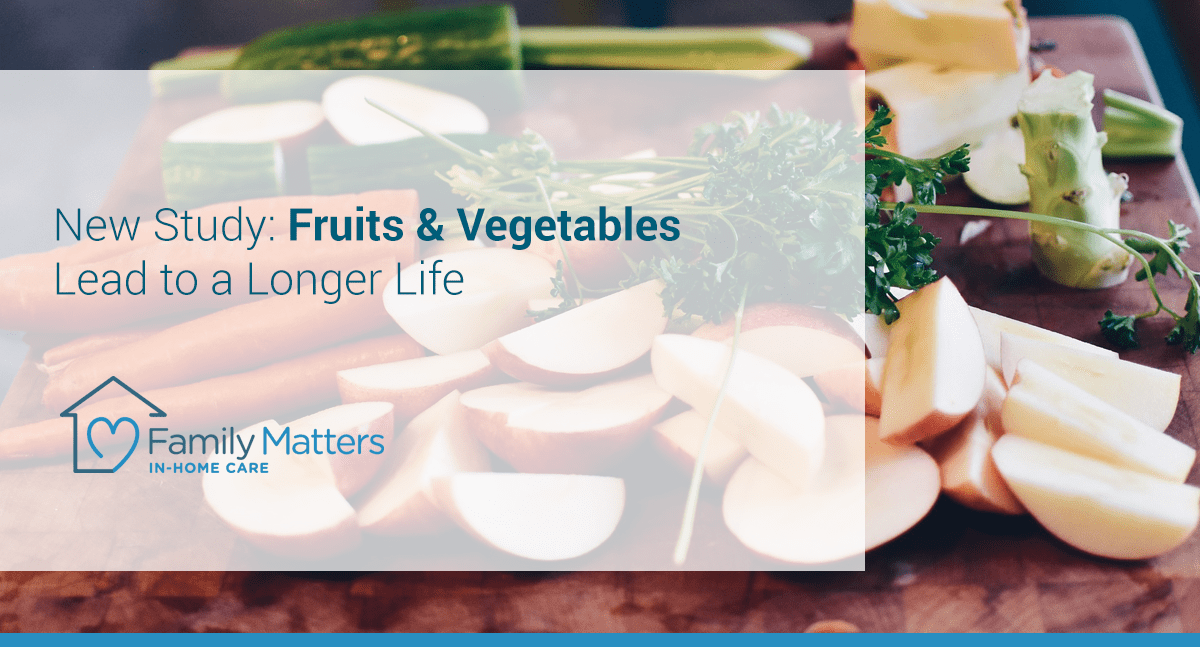
New Study: Fruits & Vegetables Lead to a Longer Life
We all know that fruits and vegetables are good for us. They are packed with vitamins and that are good for our heart, brain, muscles, and vital organs. Now scientists have concluded that eating a diet rich in fruits and vegetables can help us to live a longer life as well.
A new comprehensive study has discovered that the Mediterranean Diet may help people over the age of 65 to avoid chronic disease and live longer. It was conducted at the I.R.C.C.S. Neuromed Mediterranean Neurological Institute in Italy and had two parts:
- A study that followed 5,200 people aged 65 and older for approximately 8 years.
- An analysis that added data from several other studies, bringing the total of older individuals evaluated to 12,000.
The goal of the study was to expand understanding of the benefits of the Mediterranean Diet. Scientists already knew that it was highly beneficial for people in general, but they wanted to increase understanding of its benefits for older people specifically. The findings were clear; the closer a person adhered to the Mediterranean Diet, the longer they survived.
Researchers used a 10 point diet score to rank participants adherence to the diet. They found the following:
- In the group of participants that was followed for eight years, for every point their diet score increased, there was a reduction in their risk of dying from coronary artery disease, cerebrovascular disease (affecting blood circulation in the brain) and other diseases not related to cancer or heart disease.
- When they added data from other large studies, they found the same results: a one point increase in diet compliance resulted in a five point decrease in the risk of death from all causes.
Scientists said that foods in the Mediterranean diet with the highest health-inducing benefits seem to be “good” fats like olive oil, and alcohol, specifically red wine, “consumed moderately, preferably during meals.”
What is the Mediterranean Diet?
Basically, it is the way that people who live around the Mediterranean have eaten for thousands of years. Variations abound now, but any true Mediterranean Diet is built on these three core guidelines:
- The majority of food eaten is comprised of plant foods such as leafy and other vegetables, nuts, fruits, legumes, whole cereals, and olive oil
- Moderate consumption of fish, dairy, meat, and red wine
- Low intake of eggs and sweets
Other important components of the diet include:
- Replacing butter with healthy fats such as olive oil and canola oil
- Using herbs and spices instead of salt to flavor foods
- Limiting red meat to no more than a few times a month
- Eating fish and poultry at least twice a week
- Enjoying meals with family and friends
- Drinking red wine in moderation (optional)
- Getting plenty of exercise
If you want to begin eating a Mediterranean Diet, here is a list that will help you stock the foods you need:
- Vegetables: Buy a range of vegetables of different colors including red tomatoes, green broccoli and/or, spinach, orange carrots, white cauliflower etc. Buy the vegetables you like to eat. Buying a range of colors helps you buy variety.
- Fruits: The same is true with fruits; buy a range of colors to buy variety. Apples, bananas, oranges, pears, strawberries, grapes, dates, figs, melons, peaches, etc.
- Nuts and seeds: Any nuts and seeds you like are good. Eat them on their own or add them to soups and salads. Almonds, walnuts, macadamia nuts, hazelnuts, cashews, sunflower seeds, and pumpkin seeds are all good choices.
- Legumes: This category includes beans, dried peas, lentils, chickpeas, peanuts etc.
- Tubers: Many people consider these to be vegetables, but technically they are tubers because they grow under the ground. They include potatoes, sweet potatoes, turnips, yams, etc.
- Whole grains include whole oats, brown rice, rye, barley, corn,, whole-grain bread and pasta.
- Fish and seafood includes salmon, sardines, trout, tuna, mackerel, shrimp, oysters, clams, crab, mussels, etc.
- Poultry: Chicken, duck, turkey, etc.
- Eggs: Chicken, quail and duck eggs.
- Dairy: Cheese, yogurt, Greek yogurt, etc.
- Herbs and spices: Using herbs and spices to season food can reduce the amount of oil and sugar used while cooking. They include garlic, basil, mint, rosemary, sage, nutmeg, cinnamon, pepper, etc.
- Healthy Fats: Extra virgin olive oil, olives, avocados and avocado oil.
Eating the Mediterranean Diet is easy and delicious, and may also lead to a longer life. That’s certainly a good reason to adopt it as a new way of eating.
If you or your family member is considering in-home care as part of a plan to age in place, contact Family Matters In-Home Care today for a free consultation. Our team is dedicated to supporting your family and helping older adults enjoy life in the comfort of their own home for as long as possible.
Some of the services offered by Family Matter In-Home Care include: Alzheimer’s & Dementia Care, Bed & Wheelchair Transfer Assistance, Companionship, Housekeeping & Meal Preparation, Personal Care, Recovery Care, and Transportation.
